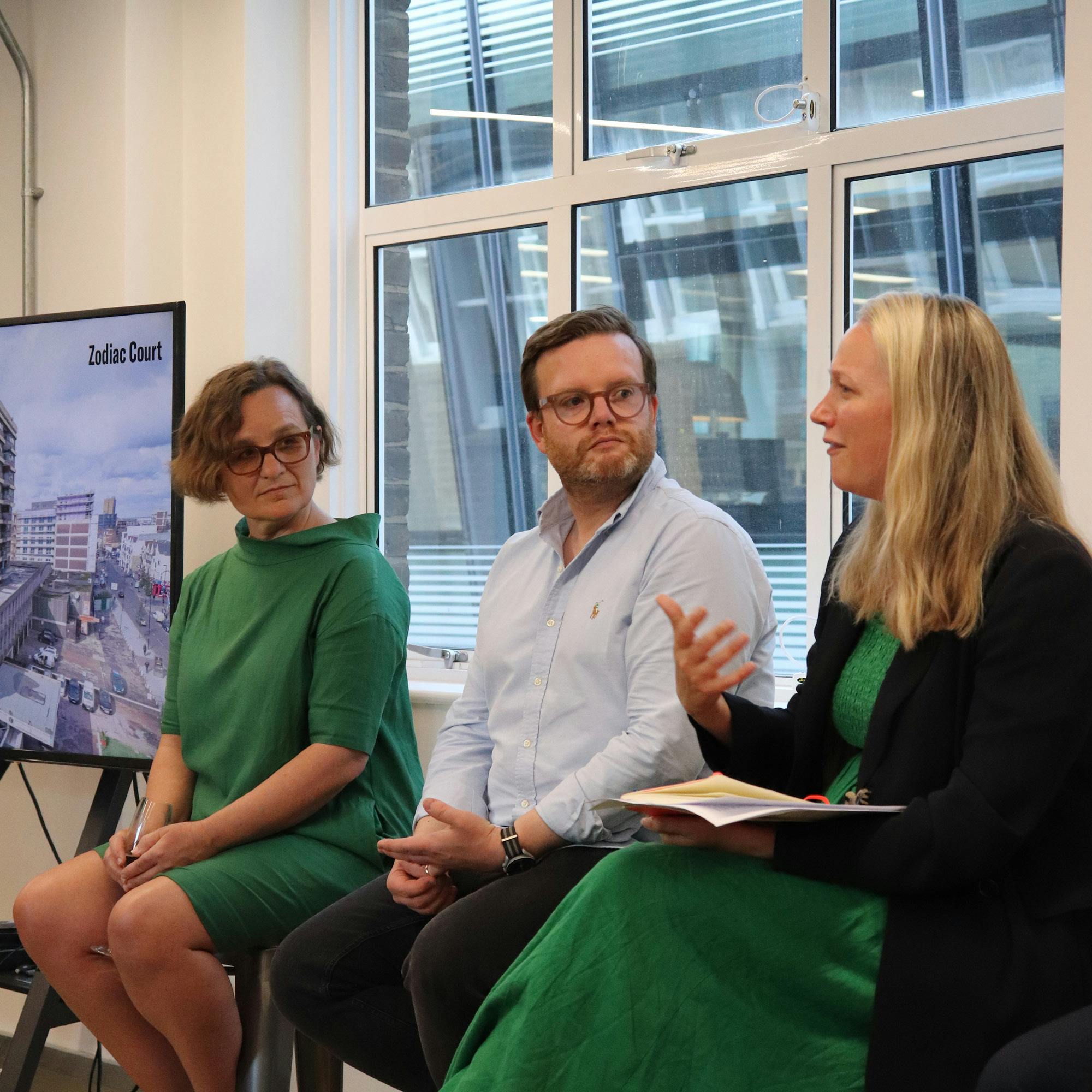Retrofit vs Demolition
A London Festival of Architecture event
Date: June 23
Author: Derin Fadina
Whilst the retrofit vs rebuild conversation has been a common theme lately with the contentious decisions on M&S, the panel discussion on Retrofit vs Demolition organised by Barr Gazetas for LFA this year offered a different approach to the topic by focusing on the 70s, 80s and 90s building stock that doesn’t have the same aesthetics and features as a listed building or that simply isn’t fit to deliver to current standards.
Architecture Today editor Isabel Allen, who chaired the event, introduced each one of the panellists (Anna Bond, Executive Director of Developments at Grosvenor; Kelly Harrison, Director at Whitby Wood; Alan Bunting, Head of Development Delivery at British Land; and Barr Gazetas' Director, Jonathan Allwood) along with a representative image of one of their projects to demonstrate the issue at hand. She began the discussion by raising the issue of the resistance to preserving so called 'ugly' buildings, to which Jonathan urged that society should get away from the notion that a new build is automatically better than a retrofit, arguing that retrofit is more challenging, more interesting, and thus more valuable. Alan joined by adding that even the ugliest building had the potential to be transformed and provide beautiful, usable, and sustainable environments.
The panel then considered the post-covid condition of offices and other commercial environments. Many offices are yet to return to their pre-covid occupancy levels, prompting the question of whether the pandemic has irrevocably affected our attitudes to office-based working, which would in turn reduce the value and necessity of retrofitting offices. Anna neatly summed up the issue: 'Landlords need tenants, tenants need talent, talent needs a reason to leave the house'. Workplaces are now competing with the comforts of working from home and providing a seamless transition and the best-in-class workplace that enhances users' wellbeing is key in the post-pandemic world. Kelly and Alan added that tenants' priorities have shifted in the past five years, with sustainability and net zero being the key criteria when it comes to finding an office space.
Isabel then raised the controversial but important question: 'Is the architect redundant in the context of retrofit, given how minor the aesthetic changes to retrofitted buildings often are?' Everyone agreed that collaboration is key and that each component of the design team brings different skills that can't be replaced. The attention to detail that an architect brings to the table is invaluable, and when reusing buildings, there needs to be a more joined-up approach, especially when measuring embodied carbon.
The conversation then moved on to that of 'difficult to love' buildings, those that don't have the aesthetics, won't get to net zero and aren't in a prime location - what should be done about them?
Alan recognised the difficulties that come with these buildings, arguing that sometimes we need to see these buildings from a different perspective, and that even a slight change of use can often add more value than a total rebuild, making it more useful to the immediate community. Anna and Kelly agreed that the argument of ‘Refurbishment vs Demolition’ is far more nuanced than it seems at first glance. It's about seeing the numbers, analysing what's viable, looking at carbon and seeing the two options as individual things. Sometimes in rare cases, demolition is the answer, but each building needs to be assessed individually, and emotions need to be left outside of the argument. Jonathan also added that there are still many things that can be done to reduce the impact if the only option is demolition, such as salvaging materials from site and reusing stock in different buildings, like we have done at Holbein Gardens for Grosvenor.
To end the discussion, the panel touched on dealing with regulations and planning authorities, as well as the challenges of immediate attitudes from stakeholders and communities. Mistrust of developers can become a barrier to doing the right thing, said Anna, as can a lack of knowledge from those enforcing policies. But the panel agreed that we are all on a journey, and long term we need to stay ahead of policy. Jonathan added that to make things easier to deliver, we need to see progress when it comes to regulations. The Part Z proposal is a great initiative, but it's a slow process that has gained traction because of a push from private sector innovators. What we really need, our panel agreed, is for regulators and government to get behind basic, achievable targets that the whole industry can work towards.
The panel remains singularly committed to retrofit, however it recognises that a concerted effort from all corners of the industry is required to push the agenda forward. As Barr Gazetas continues to reduce carbon emissions within their projects and working practices, they believe that debate and discussion with industry leaders, such as that had at the Retrofit vs Demolition event are essential to remediate our role in the climate emergency.

